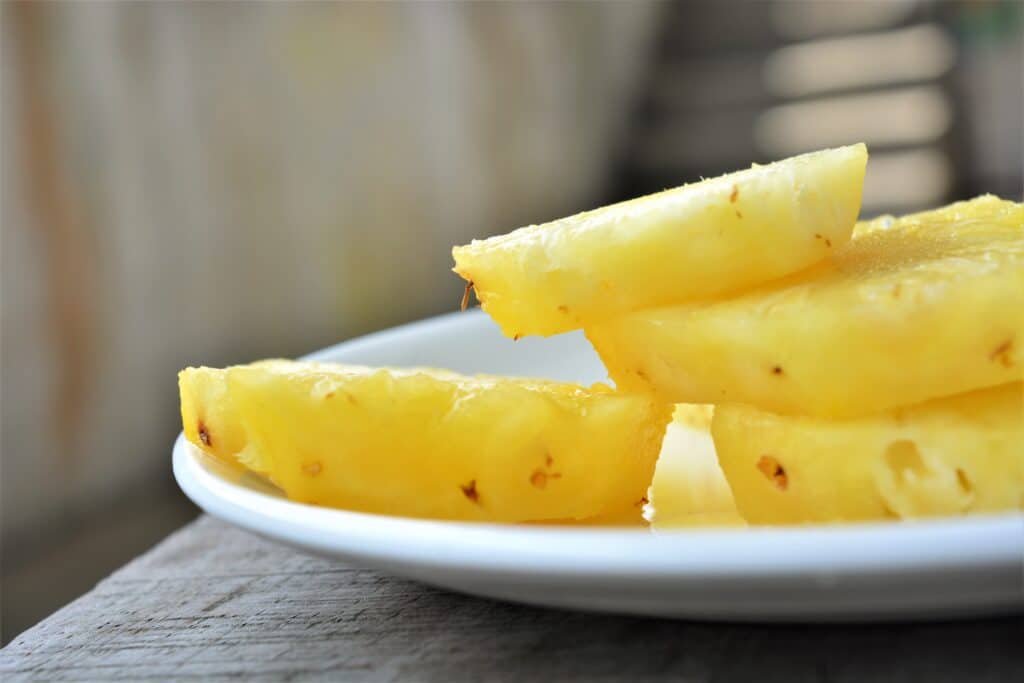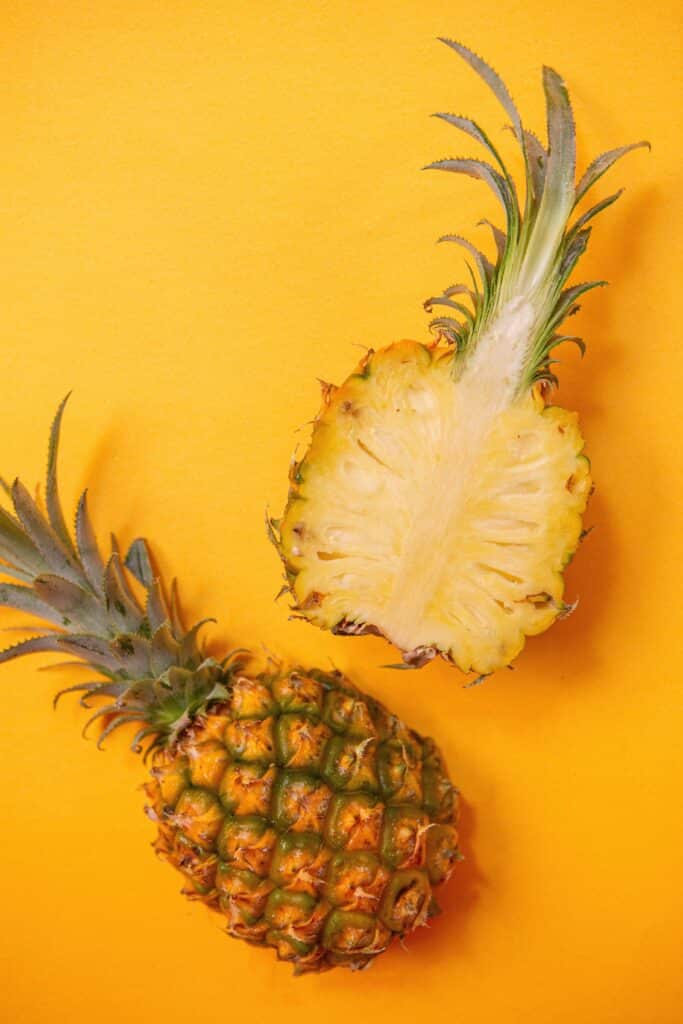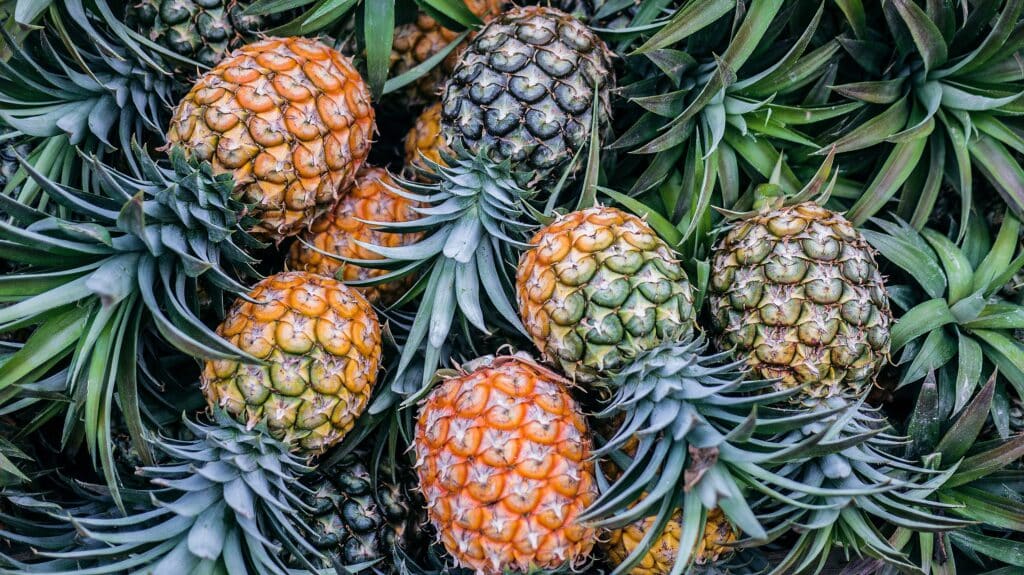What is a Keto Diet?
The keto diet is a high-fat, low-carb plan. It makes the body burn fat instead of carbs for energy. The purpose is to get the body into a state of ketosis. In this state, ketones power the brain and muscles instead of insulin. This change in metabolism helps with weight loss, improves insulin sensitivity, and may have other health benefits.
So, is pineapple on the keto diet? A cup of sliced pineapple has 22 grams of carbs. That includes 2 grams of fiber and 16 grams of sugar. On a keto diet, this amount is hard to fit into daily macros.
You can still enjoy pineapple on keto. Use it as a garnish or flavoring, not a snack or dessert. Or, choose canned pineapple packed in water instead of syrup. This cuts down on sugar. So, while pineapple isn’t keto-friendly, you can still enjoy it in small amounts with adjustments.
Understanding Pineapple

Is pineapple a keto-friendly fruit? Let’s explore the nutritional value of this tropical treat!
| Nutrient | Amount per 100g |
|---|---|
| Calories | 50 |
| Carbs | 13.1g |
| Fiber | 1.4g |
| Sugar | 9.9g |
| Fat | 0.1g |
| Protein | 0.5g |
Unfortunately, due to its high carb and sugar content, pineapple is not suitable for a strict keto diet. However, adding small amounts of pineapple to a balanced keto diet may still be an option for those who are not following the diet strictly or are in the maintenance stage.
Though it may not be full of keto-friendly nutrients like fats and proteins, pineapple packs a punch when it comes to vitamins and minerals, including vitamin C, manganese, and bromelain. This powerful enzyme helps with digestion and reduces inflammation.
Pineapple Nutrition Facts

To understand the nutritional value of pineapple for your keto diet, dive into its nutrition facts. This will help you determine whether to include or exclude it from your meal plan. Carbohydrates in Pineapple, Fiber in Pineapple, Vitamins, and Minerals in Pineapple, these sub-sections will shed light on its health benefits, so you can make an informed decision.
Carbohydrates in Pineapple
Pineapple’s Carbohydrate Composition!
Pineapple is a tropical fruit known for its unique taste and health benefits. It contains three monosaccharides, which are glucose, fructose, and sucrose. These sugars make up the majority of the fruit’s carb content.
Here’s a table to provide more clarity:
| Sugar Type | Amount per 100g |
|---|---|
| Glucose | 1.6g |
| Fructose | 3.5g |
| Sucrose | 1.1g |
Despite its high sugar content, pineapple is still healthy. It’s low in fat, high in fiber, and rich in vitamin C, manganese, and bromelain. This enzyme is believed to reduce inflammation.
In conclusion, carbohydrates provide our bodies with energy. However, it’s important to consume them in moderation. Eating pineapple as part of a balanced diet can be beneficial without causing any health risks.
Fiber in Pineapple
Pineapple is a great source of dietary fiber. Its soluble fiber helps control blood sugar and cholesterol levels. Eating this fruit regularly can help manage weight, as it makes you feel full, so you eat fewer calories. It contains insoluble fiber too, which helps digestion and prevents constipation. Plus, its high water content keeps you hydrated and promotes gut health.
Pineapple is low in fat and calories, but rich in vitamins, minerals, and bromelain enzyme. Eating pineapple may have anti-inflammatory benefits, improve immunity, and reduce the risk of certain diseases. The bromelain content might even help with wound healing.
You can enjoy pineapple raw or add it to dishes like salads, smoothies, and stir-fries. So why not add some tropical sweetness to your diet with this nutritious fruit?
Vitamins and Minerals in Pineapple
Pineapple is jam-packed with vitamins and minerals, making it a top-notch part of anyone’s diet! These nutrients grant a plethora of benefits to the body, aiding in overall health and wellbeing.
To better understand the vitamins and minerals in pineapple, look below. This table details each nutrient type and the quantity within one cup of freshly chopped pineapple.
| Nutrient | Quantity |
|---|---|
| Vitamin C | 78.9 mg |
| Thiamin | 0.1 mg |
| Riboflavin | 0.1 mg |
| Niacin | 0.8 mg |
| Vitamin B6 | 0.2 mg |
| Folate | 29 mcg |
| Pantothenic Acid | 0.3 mg |
| Calcium | 21 mg |
| Iron | 0.5 mg |
| Magnesium | 20 mg |
| Potassium | 180 mg |
Besides these nutritious facts, pineapples may also boost digestion. This is due to their high fiber content and bromelain, a digestive enzyme. Plus, research suggests that high vitamin C intake may boost the immune system and help protect against certain diseases.
Pineapple and Keto Diet

To understand how pineapple fits into your keto diet, here’s a closer look at its carbohydrate content, keto-friendliness, and recommended serving size. Pineapple’s Carbohydrate Content and Keto Diet, Is Pineapple Ketogenic?, and Allowed Serving Size of Pineapple on a Keto Diet are the sub-sections that will help you make informed decisions about incorporating this fruit into your keto meal plan.
Pineapple’s Carbohydrate Content and Keto Diet
Pineapple is a yummy tropical fruit. But, can you have it while on a keto diet? The carbohydrates in pineapple make it a less favorable choice.
Let’s look at the carb content of pineapple:
| Fruit | Carbohydrate Content | Net Carbs per 100g |
|---|---|---|
| Pineapple | 13.12 g | 11.82 g |
As seen above, a 100g serving of pineapple has 13.12g of carbs. This amount may be too high for someone on a strict keto diet. However, pineapple has other nutritional benefits too. It contains vitamins and minerals such as vitamin C and manganese. So, eating pineapple in moderation can still be part of a balanced keto lifestyle.
Is Pineapple Ketogenic?

Pineapple is not a typical keto food due to its high carbs. It provides essential vitamins and minerals, but should be eaten in moderation.
One cup of pineapple contains 22 grams of carbs, 16 of which come from sugar. This exceeds the daily carb intake for those following a keto diet, which is usually less than 50 grams.
We can incorporate pineapple into a keto-friendly diet. For instance, pairing it with healthy fats like avocado or nuts can slow digestion and prevent blood sugar spikes. The nutritional content of pineapple depends on things like ripeness and preparation method. To get optimal results, choose fresh pineapple over canned varieties, and enjoy it in small amounts as part of a well-rounded ketogenic diet.
Allowed Serving Size of Pineapple on a Keto Diet
On a Keto diet, monitoring carbs and sugar is key. Pineapple has naturally high sugar content, so the serving size may differ for different people. Let’s take a peek at the suggested serving size of Pineapple for Keto dieters.
| Product | Serving Size | Net Carbs Per Serving |
| Fresh Pineapple Chunks (100g) | 1/2 cup | 10g |
| Canned Pineapple Rings (150g) | 1 ring | 20g |
Fresh pineapples should be eaten in moderation. As canned pineapples often have added sugars, it’s best to avoid them or just have them once in awhile. Furthermore, don’t combine Pineapple with other high-carb fruits.
If you’re on Keto, you can still savor Pineapple by being aware of your portion size and net carb amount. Monitor your body’s response to food items and adjust accordingly to get the most out of your diet.
Benefits of Pineapple
To fully understand the benefits of pineapple in your diet, delve into the nutritional and health benefits of this tropical fruit. By exploring these sub-sections, you’ll gain insight into the vitamins, minerals and other nutrients that make pineapples such a healthy food choice. You’ll also discover the impressive array of health benefits associated with eating pineapple regularly.
Nutritional Benefits of Pineapple
Pineapple is full of vitamins, minerals and other important nutrients. It has Health Benefits of Pineapple, making it a great option for your diet. This tropical fruit contains Vitamin C, enzymes, antioxidants and compounds that can shield you from various diseases.
- Vitamin C in Pineapple helps skin health and lets the body absorb iron from plant-foods.
- Bromelain in it reduces protein and lowers swelling and pain.
- Manganese in it improves bone formation and boosts the immune system.
- Low calories and high fiber content make Pineapple a great snack for weight loss.
Adding fresh Pineapple to your diet can give you more Health Benefits of Pineapple. One cup of raw pineapple chunks can provide enough Vitamin C for the day. Also, diced Pineapple in yogurt or chia pudding with coconut flakes will create a tropical breakfast full of antioxidants and nutrients.
Health Benefits of Pineapple
Pineapple, a nutritious tropical fruit, has many health benefits! It contains Vitamin C, manganese & dietary fiber. Consuming pineapple boosts immunity, helps digestion & reduces inflammation. Also, Bromelain, an enzyme, acts as an anti-inflammatory agent for healthy bones. Pineapple can even benefit people with respiratory disorders such as asthma & cystic fibrosis.
Furthermore, pineapples are packed with essential minerals like Potassium, Magnesium & Calcium making it ideal for athletes & active people. Additionally, pineapple:
- Improves digestion by breaking down food proteins into amino acids for better absorption.
- Helps in weight loss due to low calories & high water content.
- Boosts immunity with Vitamin C.
- Fights cancer by neutralizing harmful free radicals.
- Promotes healthy skin with collagen & repairs sun damage.
Risks and Side Effects of Eating Pineapple on a Keto Diet

To avoid any risks and side effects while incorporating pineapple into your keto diet, this section with sub-sections on ‘Pineapple’s High Glycemic Index, Pineapple’s Digestion and Absorption, Pineapple’s Allergic Reactions’ will be your solution. These sub-sections will explain the potential dangers of incorporating pineapple into your low-carb diet and ways to safely consume it.
Pineapple’s High Glycemic Index
Pineapple’s glycemic index is high, which can cause a rapid surge in blood sugar levels. This could take the body out of ketosis. Therefore, consuming pineapple could lead to health issues while on a ketogenic diet.
Notably, one cup of pineapple contains around 22 grams of carbohydrates. This exceeds the daily limit for a keto diet. The sugar content makes it a bad choice for those trying to stay in ketosis or control their blood sugar levels.
Research has shown that moderate fruit intake can be beneficial. However, dietary needs are individual. Pineapple could be a risk and cause side effects for some people on a keto diet, if they exceed their daily carb limit. Thus, it is important to read nutrition labels and consult a medical professional before adding it to a keto meal plan.
Pineapple’s Digestion and Absorption
Pineapple can be eaten on a keto diet, but it can have risks. Its sugar content may raise insulin levels and disrupt ketosis. It may also slow digestion, leading to bloating, gas and stomach cramps.
To reduce these issues, it’s best to eat pineapple in moderation. Opt for fresh or frozen, without added sugar. Bromelain enzymes in pineapple can help break down proteins. But excessive bromelain can cause skin rashes, vomiting and nausea.
So, check with a dietician before changing your diet. Everyone’s body is different.
Pineapple’s Allergic Reactions
Consuming pineapple on a keto diet may result in allergic reactions for certain individuals. Signs can include itching, swelling, and breathing difficulty. These effects are brought on by an enzyme known as bromelain in the fruit. People who are allergic to latex may also be sensitive to pineapples due to similar proteins. It’s best to consult a healthcare professional prior to adding pineapples to a keto diet.
Furthermore, pineapples have a higher sugar content than other low-carb fruits recommended on a keto diet such as berries or avocados. Eating too much of the fruit could raise blood sugar levels and take someone out of ketosis.
It is essential to note that even though some people may have negative reactions to consuming pineapples on a keto diet, there are plenty of health benefits to the fruit. Pineapple includes antioxidants which guard against cell damage and inflammation. It also helps digestion due to the presence of bromelain.
Conclusion: Can You Eat Pineapple When on Keto Diet?
Pineapple–rich in nutrients and sugars–can fit on a keto diet. But, remember: one cup has 22 grams of carbs! That could be too much for some. So, it’s better to consume Pineapple in moderation. Or, have small amounts occasionally.
For the best results on a keto diet, opt for low-carb fruits like berries or avocados. Pineapple has Vitamin C and antioxidants, but also balance it with lower-carb alternatives.
Frequently Asked Questions
Yes, but in moderate amounts. Pineapple contains carbohydrates, and excessive intake can sabotage your keto weight loss goals.
One cup of raw pineapple chunks contains a total of 22 grams of carbs, including 2.3 grams of fiber. Therefore, if you decide to eat pineapple, you should account for the number of carbs in your daily intake to maintain ketosis.
Canned pineapples often contain added sugar which can throw you out of ketosis, so it’s best to avoid them. Select fresh pineapples or frozen options with no added sugar or any other ingredients.
Pineapple is a rich source of vitamin C, manganese, and bromelain, an enzyme that helps in digestion. It also has anti-inflammatory and antioxidant properties.
Yes, but it’s best to eat pineapple in moderation as it still contains carbohydrates. To ensure that you stay within your daily carb limit, you should track your pineapple intake and stick to a high-protein, low-carb diet plan.


